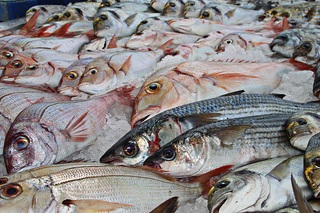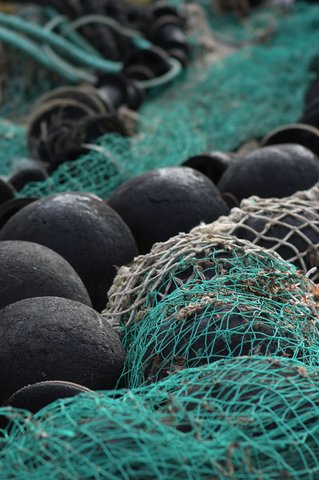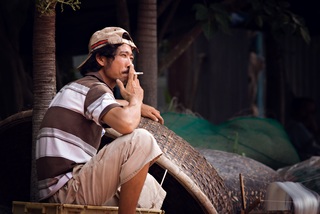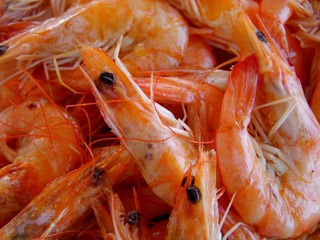
Ever since the documentary Seaspiracy appeared on streaming platform Netflix, we’ve all been painfully aware that consuming fish and shellfish is damaging our planet for the long-term. The world’s seas are suffering the effects of overfishing and even the vast amounts of plastic rubbish being thrown in by the fleets involved. It’s not just the seas themselves that are being worked to death, however: many people are also falling victim to the fishing industry. Thailand, where migrants are being enslaved and abused on fishing boats, is one example. Often, the boats people are caught, held and forced to work aboard will remain at sea for months at a time, making escape impossible.
CAPTIVITY AND FORCED LABOUR ON THE HIGH SEAS

Thailand has the world’s third-largest fishing industry (figure correct as at 2016). In a report carried out by The Guardian in 2015, freed survivors described the terrible things that had been done to them on Thai fishing boats. Most of the victims were migrants from Myanmar, Indonesia or Cambodia who had been working illegally in the country. Some reported that before being abducted, they had never set foot on a boat before, and that they feared for their lives. Research suggests a number of the boats in the fleets are kept stocked with fuel and provisions by “mother ships” at all times, making it possible for them to remain out to sea for long periods of time without ever needing to return to port. That’s a lot of fish – but it also means the workers on board have absolutely no way to escape. Some of the victims report not having set foot on dry land for years on end, being forced to work for up to 20 hours a day and being given hardly any time to sleep or eat. In this floating hell, people are beaten, raped and essentially worked to death.
But how do people end up on these fishing boats, where it is even possible for them to be isolated, exploited and abused in this way? Do severe human rights violations such as these belong in the past, or is the problem of slavery alive and kicking – but in the Thai fishing industry? We get to the bottom of these questions.
ATTRACTED WITH LIES AND DECEPTION

Thailand’s economy has been booming for several years now. The higher standards of living this has brought have also meant local workers have been demanding higher levels of education, and the number of Thais willing to do badly-paid, physical work has been falling. As a result, the country’s economy is becoming increasingly dependent on foreign workers. People from lower-income neighbouring countries such as Indonesia, Myanmar and Cambodia cross the border into Thailand in the hope of earning good money while there. Because legal migration is bound up with major bureaucratic costs, however, many people choose to enter the country illegally.
This makes the foreign workers fertile ground for the dubious activities of placement agencies, who know just how to exploit the new arrivals’ vulnerability. They promise they will be able to find them a well-paid job, and specialise in luring people in from the destination countries. After being promised stable, well-paid employment in factories, the foreign workers are pressured to sign contracts they do not understand. The victims are often charged high placement fees as well, which they then only pay off by working for nothing. In one survey, the vast majority of workers questioned (94 percent) actually said they had not been given any written contract of employment at all.
“YELLOW CARD” FOR THAILAND
Ten years ago, a report by the International Organisation of Migration documented the extent to which Thailand has become tangled up in human trafficking and slavery. Since the reality of conditions has become known, the EU and the USA have been exerting pressure on the Thai government, which has been accused of knowing what goes on just off its coasts, but taking no action to address the situation. The European Union issued an official warning in 2015 stating that Thailand should fight the human rights violations as quickly as possible, or sanctions such as an import ban on fishing products would follow. For a “fishing giant“ such as Thailand, this would have meant painful losses. The government pledged to address the situation, obligating the executive to check every fishing boat leaving or arriving in port. It also tightened up fines on those involved in abusing workers’ labour rights and human rights.
THE STRUGGLE AGAINST SLAVERY GOES ON
In reality, unfortunately, the reforms put in place have had little influence on the conditions of foreign workers. According to Human Rights Watch, in fact, their situation could even have deteriorated in some respects. Although the laws look good on paper, in practice the boats are not inspected sufficiently. Apart from this, it is effectively impossible for migrants to organise themselves collectively in any way; in Thailand, only nationals of the country are permitted to found or head a union. One thing is clear: Thailand needs low-paid workers from abroad to benefit its economic growth.

In 2020, however, instead of ratcheting up the pressure on the country, the EU withdrew the “yellow card” it had previously given Thailand.
Only this year, a Thai national was indicted on suspicion of trafficking Rohingya* refugees into the country and selling them on into the fishing industry.
Although reports of these notorious fishing boats have fallen in recent years, this doesn’t mean the country has completely rid itself of the problem of human trafficking. As consumers, we, too, bear some responsibility. The best thing would undoubtedly be to give up fish and shellfish completely – for the sake of the environment and the people working there alike.
* The Rohingya are an ethnic group from Myanmar (formerly Burma) who have been persecuted and driven out of their country.
